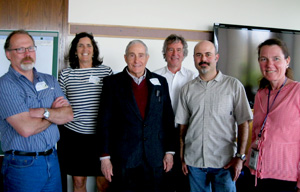
A version of this story was originally published in the Summer 2012 UW SRP eBulletin.
In May, Dr. David Ehrenfeld from Rutgers University was the invited speaker at the UW-SRP Agency Seminar at EPA Region 10. His presentation was entitled, “Predicting the Effects of Technology: When Risk Assessment is Risky.” Dr. Ehrenfeld is well recognized for his writing and expertise in sustainability, globalization and energy conservation; he is founding editor of Conservation Biology and a Fellow of the American Association for the Advancement of Science. The audience included staff from the Washington State Department of Health, EPA Region 10, the state’s senate committee on the environment, the University of Washington and independent environmental consultants.
With advances in technology we are now able to make profound changes in the world in an increasingly short period of time, and thus our need for dependable predictions has grown significantly. Recognizing the importance of determining when predictions are reliable has become essential to the health and welfare of life on the planet.
Speaking as a biologist with an interest in the interactions of nature, technology and society, Dr. Ehrenfeld pointed out that certain risk assessments involve complex systems that have many interactive, tightly bound and coupled subsystems. He provided six characteristics that may indicate when complex system risk assessments may be of questionable value: 1) when proposed strategies for preventing problems or reducing damage have never been or cannot be tested under real conditions; 2) when there are many complex interacting systems involved, particularly ecological and human social systems; 3) when there are features of the system beyond our present comprehension or inspection; 4) when a prediction model used is extended unrealistically far into the future; 5) when the potential downsides are already identifiable and known to be serious; and 6) when there is no provision within the assessment for a follow-up with the possibility of adaptive management.
The UW-SRP sponsors regular seminars held in Seattle at the regional EPA headquarters. These seminars are directed toward an audience of agency staff involved with risk assessment and communication at Superfund sites, such as EPA Region 10 and the Washington State Departments of Health and Ecology. The series provides a forum for intra-agency discussions with scientists about current research and applications of the science.
Pictured Above (Left to Right): Dave McBride (DOH), Katie Frevert (UW-SRP), David Ehrenfeld (Rutgers U), Tom Burbacher (UW-SRP), Marc Stifelman (EPA) & Kira Lynch (EPA)

